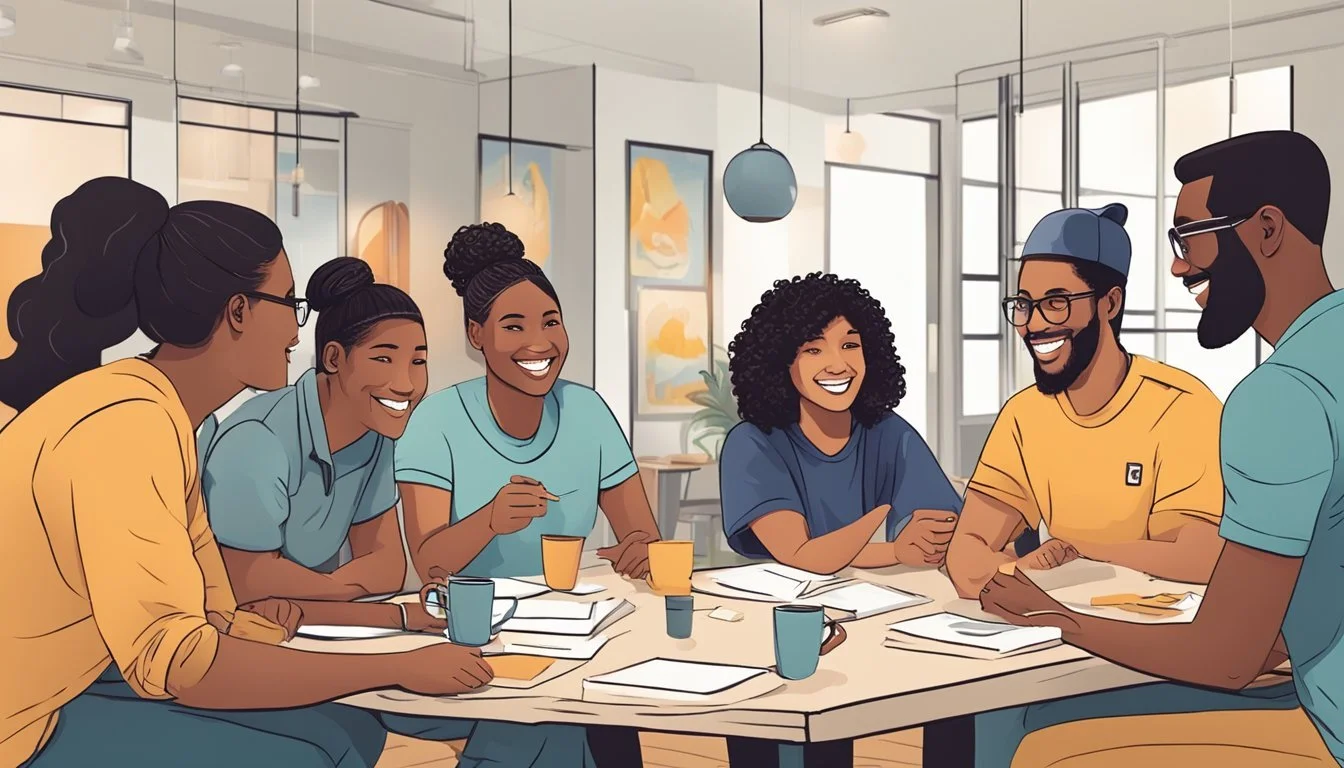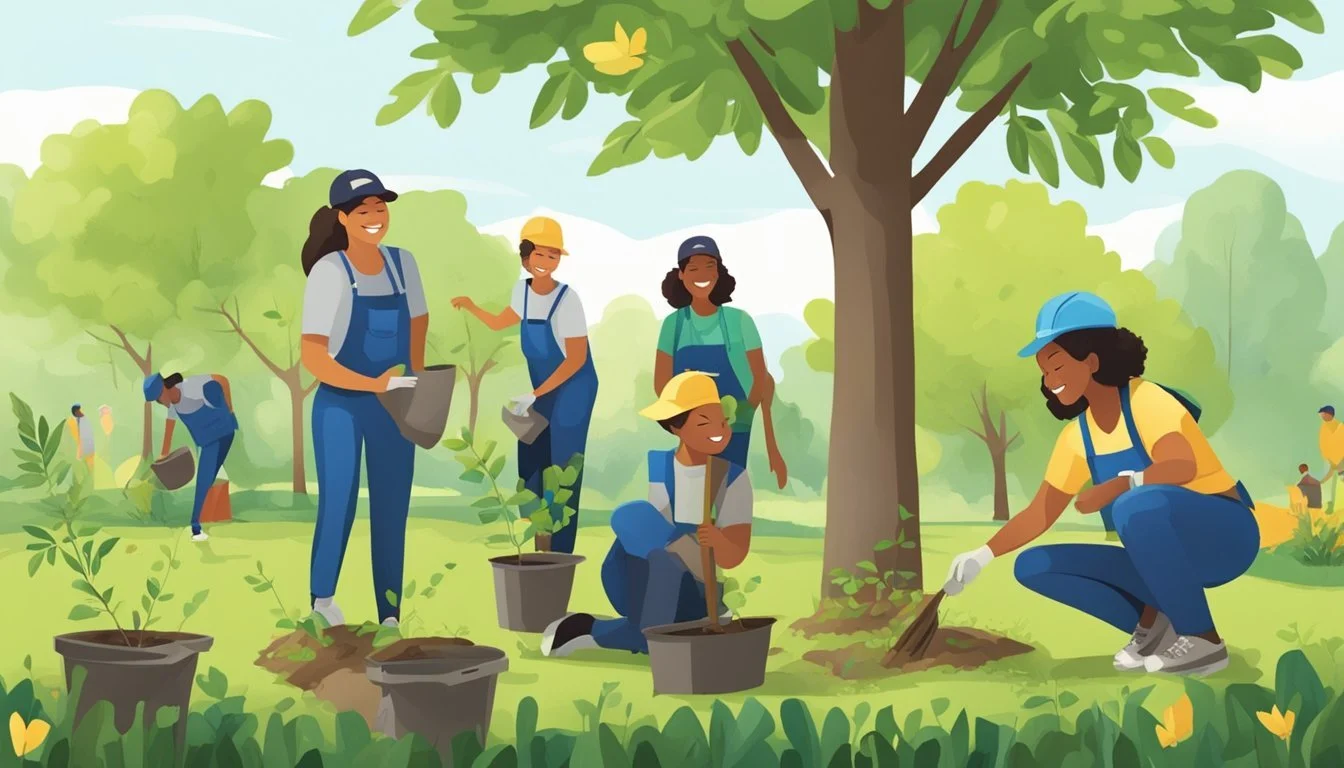9 Ways Volunteering Can Help You Make New Friends
Strengthening Social Bonds
Volunteering offers numerous benefits, with one of the most significant being the opportunity to make new friends. By participating in shared activities, individuals can connect with others who share similar interests and values.
This article will explore how volunteering can expand your social circle and foster meaningful relationships. From community service to organized events, these activities provide a platform for social interaction and personal growth.
1) Community Clean-up Projects
Participating in community clean-up projects is a fantastic way to make new friends. These events bring together like-minded individuals who care about the environment and their neighborhood.
Community members often find common ground while working side-by-side to beautify a local park, beach, or vacant lot.
Volunteering in these projects fosters a sense of teamwork. Conversations easily spark up while picking up litter or planting trees. These shared experiences create strong bonds among participants.
Volunteers often come from diverse backgrounds. This variety provides an excellent opportunity to meet people you might not otherwise cross paths with. Through common goals, meaningful connections are formed.
Local clean-up events can be found through community boards, social media, or organizations like the Clean Planet Project. These events usually require no lengthy application process or long-term commitment.
Community clean-up projects also draw attention from local businesses and schools. For example, students might join to earn volunteer hours, as mentioned by TRVST.
These projects provide a platform for interaction and community engagement. Such initiatives not only help the environment but also build a network of friends and acquaintances in a supportive, encouraging atmosphere.
2) Animal Shelter Volunteering
Volunteering at an animal shelter offers a unique chance to connect with others who share a love for animals. Shelters often depend on volunteers to feed, clean, and socialize the animals, which requires teamwork and fosters strong bonds among volunteers.
Many shelters have structured volunteer programs that allow people to work together on various tasks. This collaboration helps volunteers build relationships through shared experiences and goals.
Participating in community events organized by shelters provides further opportunities to meet new people. Events like adoption fairs and fundraisers are great for mingling with fellow animal lovers.
Volunteers often form deep connections through their mutual passion for animal welfare. Sharing stories, successes, and challenges enhances camaraderie, making it easier to develop friendships.
For more details on volunteering opportunities, visit Best Friends Animal Society, which offers various ways to help.
Additionally, the Fairfax County Animal Shelter emphasizes the social benefits of volunteering, highlighting how it helps volunteers make new friends and learn new skills.
Animal shelters benefit significantly from volunteers, and in return, volunteers gain a supportive community. Those interested can explore different volunteer roles that suit their interests and availability. This engagement not only helps the animals but also enriches the lives of the volunteers through meaningful connections and friendships.
3) Hospital Assistance Programs
Hospital assistance programs provide excellent opportunities to volunteer while helping others in critical ways. Volunteers support the medical staff and patients, creating a collaborative environment.
Through tasks like delivering meals, assisting with administrative work, and offering companionship to patients, volunteers contribute significantly. They not only ease the burden on healthcare professionals but also ensure patients receive additional emotional support.
Programs such as the one at Pomona Valley Hospital Medical Center welcome individuals from all backgrounds. These programs are designed to harness volunteers' unique skills and interests, fostering a rewarding experience.
Engaging in these programs often leads to meeting others who share a passion for giving back. This common ground makes it easier to forge new friendships while making a meaningful impact on the community.
Some volunteers choose to participate in specialized projects like sewing heart-shaped pillows for patients, as noted in US News Health. These activities bring people together and offer a creative outlet for collaboration.
By joining a hospital assistance program, individuals not only contribute to patient care but also engage with a diverse group of volunteers. This fosters a sense of community and lays the groundwork for lasting friendships.
4) Local Library Support
Volunteering at a local library offers a fantastic opportunity to meet new friends. Libraries often need assistance with returning books to shelves and organizing events.
Library volunteer programs are varied. You might help visitors find information, assist with story hours, or even manage book inventories. Each activity provides a chance to engage with others.
Helping at the library connects you with people sharing your interest in literature and community service. You may find meaningful ways to contribute, such as organizing book discussion groups or community activities.
Supporting your local library can also enhance your resume. Skills developed here, like teamwork and empathy, are valued by employers. This makes library volunteering a beneficial experience both socially and professionally.
To find out more about volunteering opportunities at local libraries, visit AARP’s guide or Volunteer Work Near Me.
5) Fundraising Events Participation
Participating in fundraising events offers volunteers numerous opportunities to meet new people. Volunteers often engage with attendees, helping them understand the cause and encouraging donations. These interactions foster connections and potential friendships.
Effective communication with volunteers is crucial. Utilizing tools to maintain a steady communication flow ensures they know their schedules, tasks, and event details. This organized approach builds camaraderie among volunteers.
Volunteers serve as ambassadors of the cause, interacting with guests and encouraging participation. This role can significantly impact the event's success and enhance volunteers' social network. By providing information about auction items and activities, volunteers can connect with like-minded individuals.
Leveraging volunteers at nonprofit events requires clear expectations. Communicating these expectations beforehand helps avoid confusion, ensuring a smooth event and strengthening team unity. This clarity fosters a collaborative spirit, essential for making new friends.
Tailoring volunteer roles to their strengths boosts engagement and helps them showcase their expertise. This not only benefits the organization but also allows volunteers to bond over shared skills and interests, forming meaningful relationships.
6) Youth Mentorship Programs
Youth mentorship programs offer a unique opportunity for volunteers to build meaningful connections with younger individuals. These programs are designed to match adult mentors with young mentees, providing guidance and support through crucial developmental stages.
iMentor Volunteer Mentorship pairs students from underserved communities with mentors. These mentors help students navigate high school challenges and prepare for college and future careers. This partnership fosters strong connections, benefiting both mentors and mentees significantly.
Friends for Youth matches adult volunteers with local youth facing significant challenges. The program includes both 1-to-1 Mentoring and School-Based Group Mentoring. Adult mentors provide much-needed support, creating a safe space for young people to grow and thrive.
Boys & Girls Clubs focus on creating a supportive environment for teens. Mentorship in these clubs allows youth to explore freely, seek guidance without judgment, and receive robust support. This approach helps young people develop healthier relationships and lifestyle choices.
Youth mentorship programs contribute to higher high school graduation rates and lower dropout rates. These structured programs ensure that mentors can provide valuable academic and personal support, creating lasting bonds and fostering a sense of community. Engaging in these programs can be a fulfilling way to make new friends while positively impacting the community.
7) Disaster Relief Initiatives
Volunteering for disaster relief initiatives can be a powerful way to connect with others and form meaningful friendships. When disaster strikes, communities often need immediate assistance, and volunteers come together to provide help and support. This shared purpose can be a strong foundation for building new relationships.
Organizations like Points of Light have vast networks of affiliates specializing in volunteer mobilization. These groups facilitate connections between volunteers and nonprofits, creating opportunities for people to work closely together under challenging circumstances. This collaborative environment fosters teamwork and camaraderie.
Remote volunteer opportunities, like those offered by Team Rubicon, also allow individuals to participate in disaster relief efforts from the comfort of their own homes. This can include roles in logistics, mobilization, and planning. Working in these virtual teams can still build strong bonds and connections.
By participating in disaster relief, volunteers often find themselves working with a diverse group of individuals. This diversity can enrich their experience and broaden their social network. Sharing intense, meaningful experiences often leads to the formation of strong, lasting friendships.
Furthermore, volunteering with platforms like VolunteerMatch can connect individuals with specific skills to disaster relief efforts. This targeted approach means volunteers are more likely to meet others with similar interests and backgrounds, fostering closer connections.
Disaster relief initiatives offer a unique opportunity for volunteers to engage deeply with their communities and make new friends. These efforts create environments where teamwork, trust, and mutual support thrive.
8) Senior Citizen Companionship
Volunteering to be a companion for senior citizens is a rewarding way to make new friends. By spending time with older adults, volunteers can form meaningful connections.
Many organizations offer programs where volunteers visit seniors in their homes or at care facilities. This interaction provides seniors with social engagement and helps alleviate loneliness.
Sharing stories and experiences with seniors can be enriching for both parties. It is not uncommon to form lasting friendships through these companionship programs.
For those who enjoy listening and offering support, senior companionship can be particularly fulfilling. Volunteers often find that they gain as much from the experience as the seniors they befriend.
Some programs match volunteers and seniors based on interests and hobbies. This matching process helps to foster deeper connections and shared activities, making the friendship more enjoyable for both.
Becoming a senior companion can also provide volunteers with a sense of purpose and community involvement. It's a mutual exchange of kindness that benefits everyone involved.
9) Environmental Conservation Efforts
Participating in environmental conservation efforts is a fulfilling way to make new friends. Activities such as planting trees, cleaning rivers, and restoring habitats offer opportunities to work collaboratively.
Volunteering with organizations like The Nature Conservancy or local non-profits connects individuals with others who share a passion for the environment. These efforts often involve teamwork, fostering camaraderie among participants.
Working together to achieve environmental goals promotes a sense of community. Volunteers gain a shared purpose, leading to meaningful connections with like-minded individuals.
Additionally, spending time outdoors can improve both mental and physical health. This positive atmosphere makes it easier to bond and form friendships while contributing to worthy causes. Volunteering in these ways helps foster strong relationships through shared values and experiences.
For more ideas on how to get involved, explore The Nature Conservancy's volunteer opportunities. Another option is to join a local river cleanup or participate in tree planting drives organized by various environmental groups.
The Importance Of Social Connections
Strong social connections are vital for maintaining mental wellness and fostering a sense of trust and mutual understanding in communities. These connections have profound impacts on both mental health and the establishment of trust among diverse groups.
Mental Health Benefits
Human beings are inherently social creatures whose mental health thrives on meaningful interactions. Engaging in social connections can significantly reduce the feelings of loneliness and isolation that many people experience.
Scientific studies have shown that having a robust social network can lower rates of anxiety and depression, enhance self-esteem, and even improve immune system functioning. Being part of a supportive community offers a sense of belonging and purpose, which is crucial for overall psychological well-being.
Participating in volunteering can be an effective way to build these connections. By contributing time and effort to a shared cause, individuals feel more integrated into their community. This sense of belonging can act as a buffer against stress and other mental health challenges, providing emotional support and reinforcing positive lifestyle choices.
Building Trust and Understanding
Building trust forms the cornerstone of any healthy relationship, whether it’s personal, professional, or within the community. Social connections developed through shared activities like volunteering create environments where trust and mutual respect can flourish.
Trust is built through consistent, positive interactions where individuals demonstrate reliability and genuine concern for each other. Volunteers working together towards common goals often develop an understanding of each other's perspectives and backgrounds, which fosters an inclusive and supportive community environment.
This environment encourages open communication and cooperation, breaking down social barriers and reducing prejudice. By creating spaces where people can engage with those outside their usual social circles, volunteering helps to cultivate a community rooted in mutual trust and empathy.
Connecting through these meaningful interactions promotes a deeper understanding of diverse experiences and viewpoints, enriching the fabric of the community.
Volunteering And Community Engagement
Volunteering significantly boosts community cohesion and offers numerous opportunities for productive collaboration among individuals and organizations.
Creating Stronger Community Bonds
Volunteering acts as a powerful tool to connect individuals within a community. It fosters a sense of belonging and solidarity, uniting people from diverse backgrounds for common causes. By participating in local events or initiatives, volunteers often build lasting relationships with their neighbors and fellow community members. This connectivity not only enhances social networks but also strengthens the fabric of the community, ensuring it remains supportive and resilient in challenging times.
By volunteering, individuals gain a deeper understanding of the areas they serve. They become more empathetic and attuned to the specific needs and challenges faced by their community. This mutual understanding and support create a more harmonious and cohesive environment, promoting overall well-being and growth.
Opportunities for Collaboration
Volunteering opens doors to various collaborative opportunities. Volunteers often work hand-in-hand with local organizations, schools, and businesses, creating partnerships that benefit the community as a whole. These collaborations can lead to more effective problem-solving and resource-sharing, enhancing the impact of community projects.
For instance, a local food drive might involve collaboration between schools, non-profits, and local businesses. Such partnerships allow different groups to pool resources and expertise, ensuring more efficient and wide-reaching outcomes. Additionally, these collaborative efforts provide volunteers with invaluable experiences and skills that can be applied in other areas of their lives, both personally and professionally.
Volunteering fosters a collaborative spirit, encouraging individuals and organizations to come together for the greater good. This synergy not only improves community initiatives but also cultivates a culture of cooperation and mutual respect.







